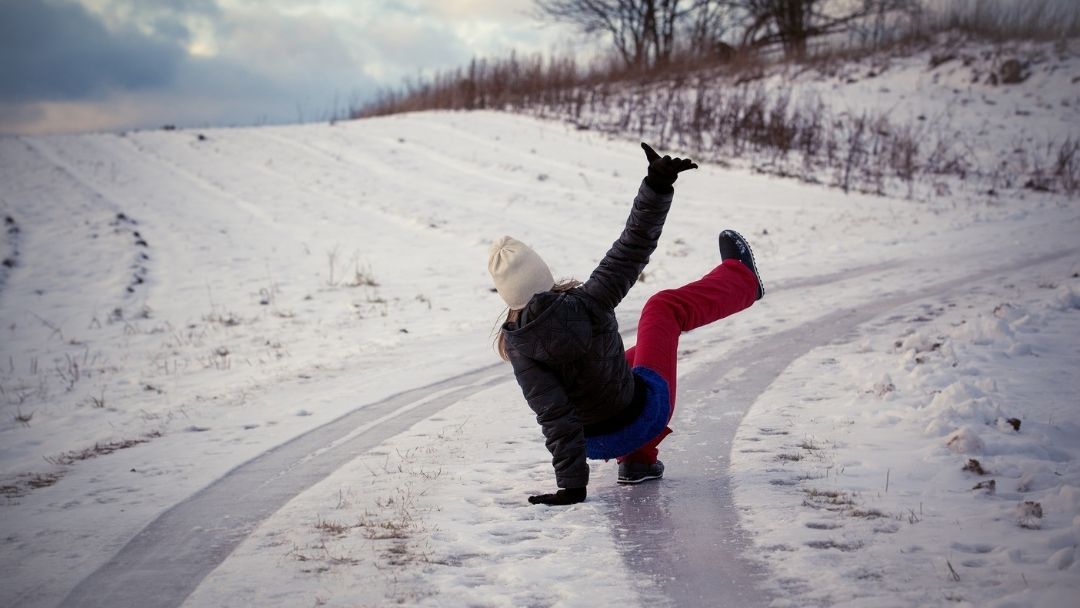With snow and ice expected across Scotland today, clinicians at Lanarkshire’s three hospitals are warning people to take special care.
Icy pavements and wet and slippy floors indoors, can cause falls that result in painful sprains and bruising but A&E is not the place to go, ‘unless it’s very serious’ say clinicians at NHS Lanarkshire’s three main hospitals.
Of the 460 or so people who turned up at emergency departments in the last three months of 2021, following falls, slips, trips and sprains, every single one was discharged home with self-care advice.
Those who turn up at emergency departments with these types of ailments are routinely facing waits of more than 6 hours to be seen; in everything but the most exceptional cases, they could be easily treated at home instead.
Slips and trips, sprains, swelling and bruising are among the most common ailments that people are presenting at emergency departments with. Older people are more likely to fall, especially if they suffer from a long term health condition, balance issues, eyesight problems or muscle weakness.
However younger people can also hurt themselves, for example playing sports or losing their footing – and the resulting sprains and strains can be painful. Pain around a joint, coupled with swelling and bruising – and an inability to put weight on the injury – is most often a sign of a sprain or strain.
Home care advice for a sprain or strain
These types of injuries are best treated at home following the four steps called ‘RICE’:
- Rest – stop any exercise or activities and try not to put any weight on the injury
- Ice – apply an ice pack (or a bag of frozen vegetables like peas, wrapped in a tea towel) to the injury for up to 20 minutes every few hours
- Compression – wrap a bandage around the injury to support it
- Elevate – if it’s your leg or foot or ankle, keep it raised on a pillow as much as possible
Avoid heat (such as hot baths and heat packs), alcohol and massages for the first couple of days, to prevent swelling.
It’s best to keep moving the joint or muscle – gently – so it doesn’t get stiff, for example by slowly rotating a twisted ankle several times throughout the day. Painkillers like paracetamol can help ease any pain and ibuprofen gel, mousse or spray can help to reduce any swelling. Your local pharmacist is always available for advice too.
While slips, trips and falls do not usually result in serious injury, there’s useful advice on the NHS website that’s especially helpful for older people.
Advice to older people in the event of a fall
- If you fall, get up slowly. Roll over onto ‘all fours’ and look for something solid that you can hold onto to pull yourself up
- Sit down for a bit after a fall, before you carry on doing things and keep warm with a blanket
- If you’re hurt or unable to get up, try to get someone’s attention by calling out for help, banging on the wall or floor, or using your personal alarm or security system (if you have one)
- If possible, use a phone to summon help: dial NHS111
Preventing slips and falls
There are some simple things that can help prevent falls, especially in older people around the house and outside in icy weather:
- Use non-slip mats in the bath/shower
- Mop up spills to prevent wet, slippery floors
- Make sure corridors and staircases are well lit
- Don’t try and lift heavy things or climb ladders
- Be especially careful if you wear ‘bifocal’ lenses: it’s easy to misjudge a step on staircase or off a curb
- Avoid going out in icy weather and if you must go out, wear sturdy shoes with grippy soles and ‘walk like a penguin’ with your feet slightly turned out
Speaking about the latest advice to people on slips and trips, sprains and strains, Dr Fiona Hunter, Consultant in Emergency Medicine, University Hospital Monklands, said: “Every month we see around 150 patients in our emergency departments with injuries caused by slips, trips, falls, sprains and strains.
“Almost without exception, every one of these patients would be better off at home, following self-care advice that’s readily available online or – if they’re really concerned – they should call 111 or attend a minor injuries unit.
“It’s vital that emergency departments have the capacity to provide life-saving care.
“None of us – least of all patients – want to spend many hours waiting to be seen when they would be more comfortable and better off looking after themselves at home.”
NHS 24 can deal with any urgent questions or concerns: call 111. There’s also more information on NHS Inform www.nhsinform.scot and advice at www.nhs.uk.

